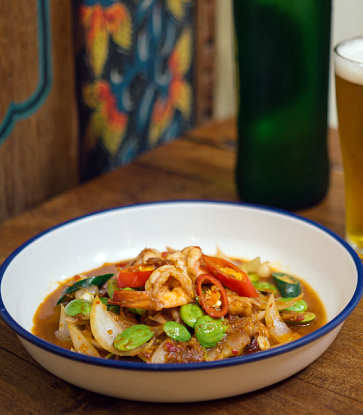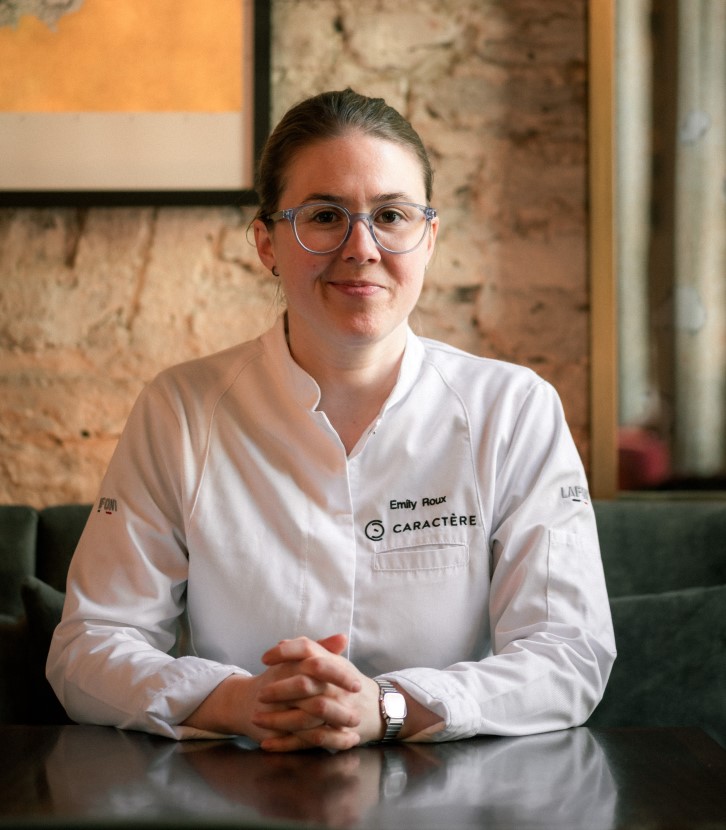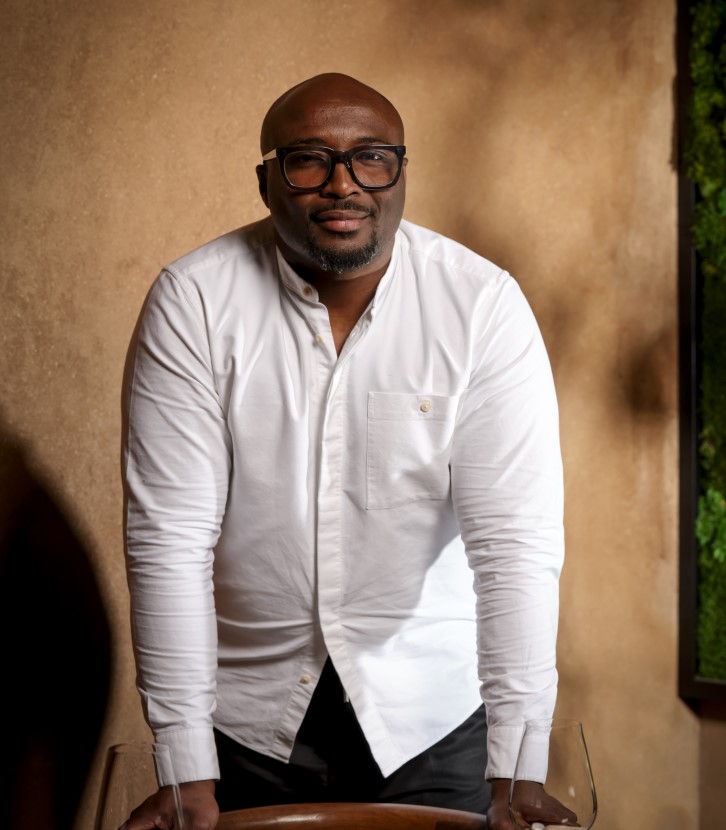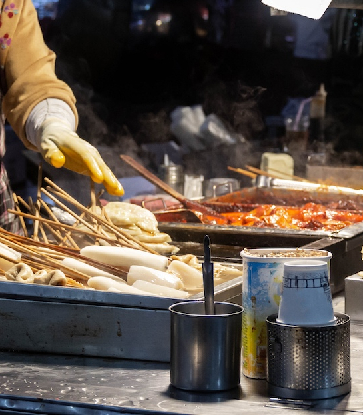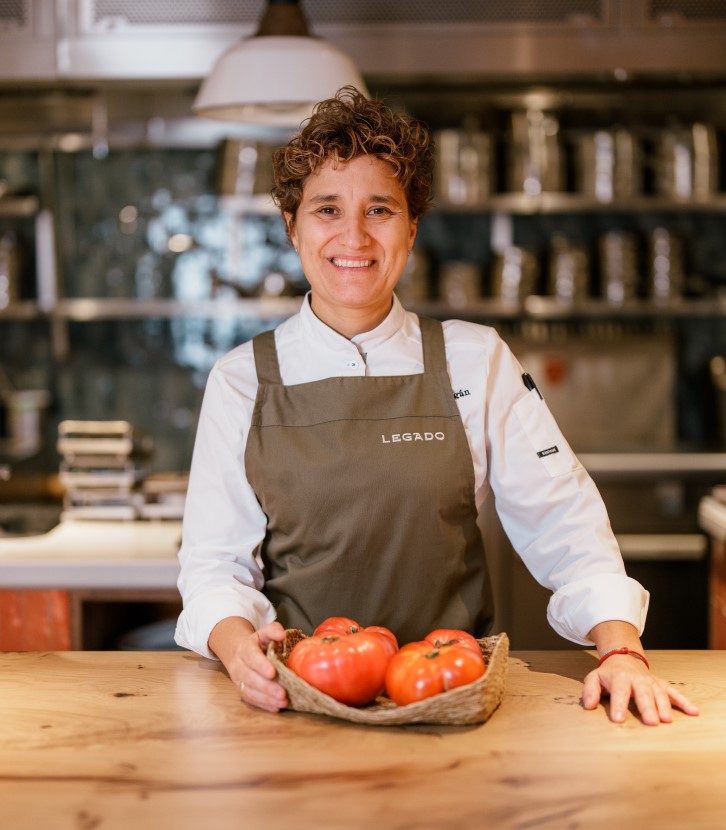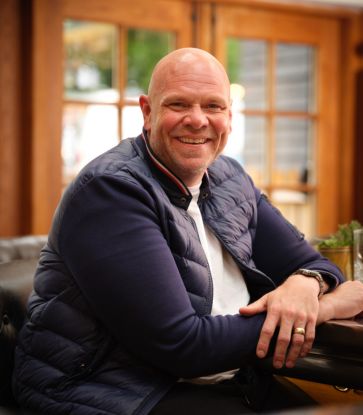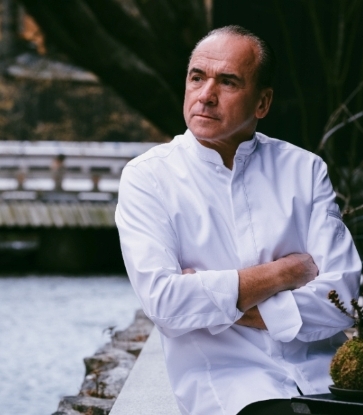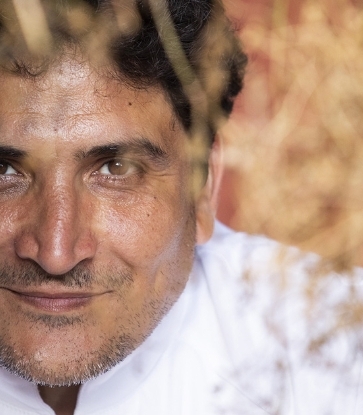It has almost been two years since Chef Andreas Caminada visited Thailand, but, even after a long flight, he still has that George Clooney of the culinary world look on him, just as he did the last time he sat with us.
When he received the MICHELIN Mentor Award in 2020, which recognises chefs who foster, educate, and promote culinary excellence as they develop young talent, Chef Caminada had already mentored five protégés to MICHELIN Stars, including Silvio Germann at IGNIV and Sven Wassmer at Memories, both in Bad Ragaz; Marce Skibba at IGNIV in St. Moritz; Daniel Zeindelhofer at IGNIV in Zurich; and David Hartwig at IGNIV in Bangkok. He still deserves that title as his acolytes continue to achieve excellence. Chef Timo Fritsche shepherded his vegetarian restaurant Oz in Switzerland to one MICHELIN Star and the MICHELIN Green Star at the end of 2022. And all four of the IGNIV restaurants have maintained their MICHELIN Stars for 2023.
This Swiss chef also made history by being one of the youngest chefs to receive three MICHELIN Stars, which he did at just 33 years old at his restaurant in a castle, Schloss Schauenstein, in Fürstenau, Switzerland at the time.
Now, as the hands of time keep spinning, it has been around three years since the pandemic wreaked havoc around the world, but Chef Caminada, at 46, has finally returned from faraway to visit his team in Bangkok.
“Really, he didn’t want to,” the chef said, turning to face his young, tattooed Swiss protégé, David Hartwig, who sat beside him. “He went to New York. He waited half a year for his visa. But my wife called him, and 12 hours later, he agreed to come.” That was one of the best decisions that his student in Bangkok ever made. This is because, even as he overcame the seemingly daily obstacles from the pandemic, he was able to transform JoJo at The St. Regis hotel, where his mentor would organise pop-ups that would be fully booked in hours, into IGNIV by Andreas Caminada and one of the best restaurants in Thailand.
“Talent is important, but also ambition.”

What was your vision for IGNIV in Bangkok?
“Sharing is very Asian. I might even say that it is the origin of the sharing concept. So, it is very interesting to see how people here respond to our food. I wanted to create a place where people feel comfortable and welcome, because it is about hospitality. At the end, it is about the hospitality and the good food at the table. And it is always the goal to be able to make people happy.”Caminada recalled the days before opening IGNIV in Bangkok. “We had a delay with the building and the planning, so we did a pop-up to introduce David. Then COVID came. Before I knew it, you [David] were in charge in March, and then it was crazy how the two years went by.”
“I’m so very glad to be back to see things running so beautifully and nicely. I’m happy how things turned out here.” He points to a table in the middle of the dining room. “But we still need to adjust the entrance.” A few hours earlier, upon his arrival, he asked his star student to prepare lunch for him. “He cooked a great lunch. Very tasty. Very nice.”
What did you learn as you opened a restaurant in a country so far away during the pandemic when you could not visit in person?
“I learned to calm down a little bit and that it is very important to spend time at home with the family. And I think we did things right during COVID, because my wife and I got to enjoy life with the kids. Bangkok was always very far away, making it difficult to be here because of the restrictions. So we invested in the castle, and we opened a restaurant called Oz with a permaculture garden opposite the castle. Once the skies opened, it was clear I would come over as soon as possible. I wanted to show them respect. I wanted to see what they had done, how things turned out, and to help out and answer questions.”You said that David left and then came back to join the team?
“He went to New York, and it was a tough time. The team and my wife called him and told him that Bangkok had sunshine, warm weather, and lovely people. He said to my wife, in that tone of his, that he was not going to come. [Hartwig later told MICHELIN that he already decided to come back but took his time to say yes.] That it was his decision. That he knew life was different there. It was a different lifestyle.“He came back to Switzerland, and we knew we had to send him here. When I talked to him on the phone, he was very positive, and he loves it here. He loves the people, the city. And that’s great. So, I’m glad to be back. It’s beautiful. The entrance, we still need to adjust.”
“We have a responsibility to give back and make the industry better.”

Has David changed or grown since you last saw him?
“I think he’s the same. It’s my job to mentor and support them. But at the end of the day, they are here. They are the hosts and their own bosses,” he explained as he turned to his cherished “son” in Thailand.“So, they have to manage the whole place themselves. And they do this great. I told him it’s not Switzerland, where there are ten chefs who speak the same language and have similar training. Now, you work with a new team. You built them up, and they are still here. It’s positive for him as a leader. It’s also important for us that we say it is personal also. It’s like a family. We need to take care of each other. To create a place where people feel joy and happiness, that’s just wonderful.”
Are you ruthless in the kitchen?
“He’s very demanding and extremely precise. Consistently. And he asks questions all the time,” answered Hartwig the student as his teacher went to get some water. “He comes every day, tries everything. It has to be just right, every service. And that’s when you will really learn to do that all the time.”“I’m back. What did he say about me? All good, yes?” Caminada asked as Hartwig smiled. “I have to help. If somebody who is 30 years old comes in and is just talking, talking, talking. I think that he’s not ready, but if I don’t help him now, to stop this, who is going to. What is he going to learn? So I have to motivate him and push hard.”
How did you feel when IGNIV Bangkok got its first Star?
“He wrote me an SMS, and it was already on Instagram. And we were like, she has a star now. So, that was a very nice feeling. Not just for me personally, but it is happiness for the team. It’s a team that achieves this. And it’s motivation for every single person working on this project. This is also his first star as a chef, and I think that is always very special. So, that makes us proud. And, yes, expectations are very high.“I always say that a job should make people happy. That’s at its most simple of course, that they come not just to work. It is also about attitude. In the end, it’s nice to get this recognition. But it cannot be the reason to stand here and work. The reason is mainly to make other people happy. Maybe remember back to your first shift and see how far we’ve come and how we can do better going forward.”
Do you remember your first Star?
“That was long ago, maybe 12 years ago. And there was nothing. I read about it in the newspaper. The same for the second star. They did a press release, I think, the night before, and some reporters received it and learned about it. It was in the newspaper the next day. Then you had to run to the libraries together to get a copy. It was crazy when I got two stars. They called me in the morning from Germany or Switzerland to tell me there was going to be a change. I thought I was reduced to one star. And then at work, the release went out. I got three stars. It was quite discreet.” He laughed.“Politeness, I think, is at the bottom of everything.”

You won the first Mentor Award in Switzerland and have had many successful chefs under your tutelage. Can you share any secrets to being a good leader?
“I think it’s something very personal. But basically, you just need to be a nice guy. Be a positive influence, and sometimes you need to set boundaries because you want to reach a goal with the team, to make people happy. Sometimes we have people who lack concentration. Sometimes you need to be tough. You have to say, hey, it’s not good enough, make it again. In the end, it’s nice to work together and let them grow, give them responsibility.“If you let someone take over as pastry chef because you need them to, then you have to let go and see what happens. We need to give them the chance to show us and themselves that they can do better, that they can take responsibility without us controlling them. A person who has ambition can do this. Talent is important, but also ambition. And the long-term thinking to put it all together.”
What are the three qualities of a good chef?
“Politeness, I think, is at the bottom of everything. A person has to connect with people in the kitchen and in this society. We have no space otherwise. Then there's consistency, because if you want to be the best chef, you have to put in the time to demonstrate your abilities. Finally, passion.”To many, you have achieved the pinnacle of success in your career. What is next?
“There are always new dreams that you need to dream out. When you have new dreams, you need to set new goals and plan your next steps. I look back over the last seven years and see we did a lot. We could have done nothing during those seven years, and nothing would have changed. So, it’s again about attitude. I think if you are to move forward, we have a responsibility to give back and make the [food] industry better.“We started the Fundaziun Uccelin Foundation five years ago in 2015 to support young talent. We’ve had more than 40 participants in the programme. This is something I do privately, offering six-month internships at some of the best restaurants that partner with the Andreas Caminada Academy.”
“The word ‘uccelin’ means baby bird,” added Hartwig. “It refers to a baby bird that can’t fly yet. We have a chef from here that is in the training programme.” The 33-year-old chef shared proudly about a member of his team.
“People can apply from all over the world. After the six months, they have to write an article about their experience. And then they’re free. Some get a job somewhere, and some become self-employed. The programme is independent, so they do not have to join us.
“Arne [Arne Riehn, pastry chef at IGNIV Bangkok] went through the programme,” he turned to protégé, who nodded. “He was one of two people who ended up working with us.”
“We need to give something back. We need to because we are the leaders.”
Illustration image: © IGNIV Bangkok




